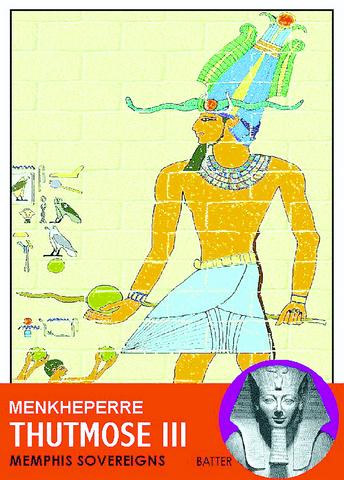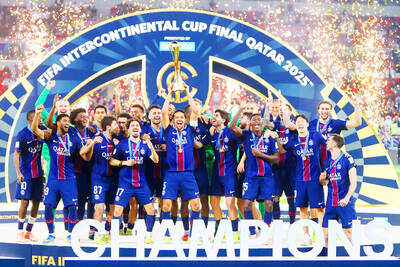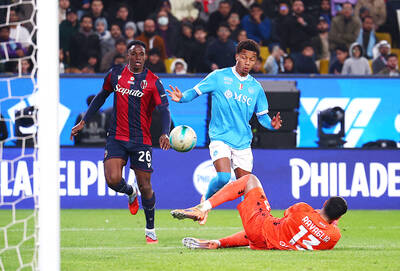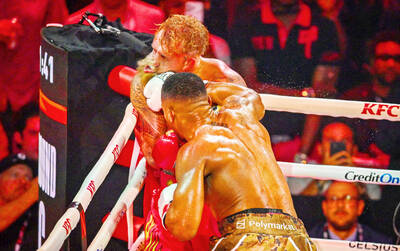No disrespect meant to Abner Doubleday or Alexander Cartwright or anybody else who might claim responsibility for the game we call baseball, but Thutmose III had them beat by three millennia or so. Thutmose ruled Egypt during the 15th century BC, and is the first known pharaoh to have depicted himself in a ritual known as "seker-hemat," which Peter Piccione has loosely translated as "batting the ball."
"The word they use is `sequer,' which literally means `to strike' or `to hit,"' said Piccione, 51, an Egyptologist and professor of comparative ancient history at the College of Charleston in South Carolina, "but in the context, he's there with the bat. I translated it as `batting the ball."'

PHOTO: NYT
The context he's referring to is a wall relief at the shrine of Hathor, the goddess of love and joy, in Hatshepsut's temple at Deir-el-Bahari, where Thutmose is seen holding a softball-size ball in one hand and a long stick, wavy at the end, in the other. The hieroglyphic over the scene reads: "Batting the ball for Hathor, who is foremost in Thebes." The date is 1475 BC.
Piccione makes a specialty of Egyptian religion.
He's particularly interested in the sports and games that the ancient Egyptians included in festivals honoring certain deities, a pursuit that led him to muse on the relationship between ancient Egyptian "baseball" and American baseball.
His findings are included in a popular lecture -- called "Pharaoh at the Bat" -- that he recently delivered in Charleston and has been honing since delivering a paper on the subject at the National Baseball Hall of Fame in 1995. In it, he describes a relationship similar to the one between, say, pterodactyls and cardinals, orioles or blue jays.
"There's no direct connection, and Egyptians don't play anything like this at all today," Piccione said. "But the Egyptian game did function as a precursor. There are only a few bat and ball games that have ever been around."
Actually, Piccione said, Egyptians probably batted the ball around, even if it was just for infield practice or a game of pepper, for nearly 1,000 years before Thutmose III. There are references to the activity in inscriptions inside the pyramids dating to 2400 BC.
Evidently the Egyptians weren't merely sluggers. They had a healthy respect as well for defense; the picture of Thutmose also shows two priests, small figures, in the act of catching a ball.
"They have their arms raised up and balls in their hands like you would catch a softball," Piccione said. "The inscription says, `Catching it for him by the servants of the gods."'
It isn't known precisely how the game was played, or if the umpires wore chest protectors. "To be honest, we don't know if they did any running," Piccione said, "but I suspect they did, because kings did a lot of running rituals."
Actually, the connections Piccione's lecture makes between then and there and here and now are more broadly cultural in nature.
"It started in Egypt as purely a boys' game," said Piccione. "And it was probably played in a festival, so the actual ball-playing took on some kind of religious meaning because it was played in a religious context."
When the king came out and played, therefore, the excitement and fun of the game and its religious meaning were consolidated, he said.
"Baseball functions the same way," he said. "Over time it has accumulated meaning. It's an interesting parallel development."
He cites the idea that every spring baseball starts up again, and as such it has become a ritual of the season. He cites the mythology that grows up around the players and lasts for generations, the near godliness of figures like Babe Ruth, the identification of the game with our country.
Happily, both in his lecture and in the interview, Piccione stopped before his musings got too ponderous. He finished both with a reading from his own version of Ernest Lawrence Thayer's Casey at the Bat, which ends, alas, just as badly for the home team: "O' somewhere in the Aten's circuit, the sun is shining bright, Nubian drums play somewhere and Hittite hearts are light/In Babylon men are laughing, in Nineveh children shout, But there is no joy in Mud-brickville, Great Pharaoh has struck out."

LOW-GOAL SHOOT-OUT: Of the nine penalties in the shoot-out, only three went in, with Flamengo’s Samuel Lino, and Vitinha and Nuno Mendes of PSG netting Matvei Safonov on Wednesday made four straight penalty saves in a penalty shoot-out to help Paris Saint-Germain beat Flamengo in the Intercontinental Cup final and win a sixth trophy of the year. The Russian goalkeeper was thrown in the air by his teammates after his exploits in the shoot-out, which was won 2-1 by PSG after a 1-1 draw after extra-time. It completed a trophy-laden 12 months for the French team, who had already won the Trophee des Champions, Ligue 1, the Coupe de France, the UEFA Champions League and the UEFA Super Cup — also on penalties against Tottenham Hotspur in

TOOTHLESS: Bologna never looked like finding a way back, and Antonio Conte and his substitutes were waiting to celebrate long before the final whistle SSC Napoli on Monday lifted the Italian Supercoppa with a 2-0 win over Bologna in Riyadh, David Neres netting both goals to earn the league champions a deserved victory over the toothless Coppa Italia winners. Neres opened the scoring with a stunning strike from distance six minutes before halftime and found the net again in the 57th minute when Bologna were caught trying to play out of defense. “We came here as champions of Italy, we wanted this trophy and we showed it with a great performance,” Napoli forward Matteo Politano told Mediaset. “We could have scored a few more goals, but

LACKLUSTER FIGHT: At one stage, the referee lost patience with the two fighters, warning them in the fourth round that ‘the fans did not pay to see this crap’ Former world heavyweight champion Anthony Joshua on Friday knocked out YouTuber-turned-boxer Jake Paul in their controversial Netflix-backed bout in Miami. The fight at the Kaseya Center, which saw both men reportedly splitting a mammoth purse of US$184 million, had triggered alarm across boxing due to the gulf in physical size and class between Britain’s two-time former world champion Joshua and Paul, an Internet personality who has forged a lucrative career through a handful of novelty boxing contests. However, in the event, Joshua made hard work of defeating his vastly less accomplished opponent, before his superior size and power eventually told

Fulham on Monday climbed away from the English Premier League relegation zone and left Nottingham Forest mired in the fight for survival after Raul Jimenez’s penalty sealed a 1-0 win. Marco Silva’s side started the day just two points above fourth-bottom Forest, but Jimenez’s first-half goal at Craven Cottage moved them 10 points clear of the bottom three. While Fulham’s relegation fears were eased heading into the Christmas schedule, Forest are just five points ahead of third-bottom West Ham United in the scrap to avoid crashing into the Championship. Forest had won six of their previous eight games in all competitions, with a